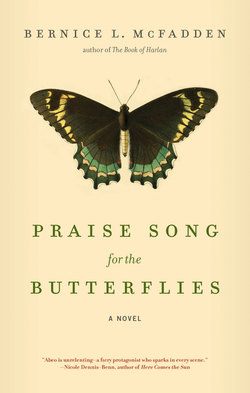Читать книгу Praise Song for the Butterflies - Bernice L. McFadden - Страница 10
На сайте Литреса книга снята с продажи.
ОглавлениеOn the morning of the day she killed him, the sun sat high and white in a sky washed clean of clouds by an early-morning downpour. A faint rainbow hovered just beyond the abandoned PS 186. The damp air hummed with hip-hop music, car horns, and courting dragonflies.
Wide hips swaying beneath the sweeping, multicolored skirt, flip-flops smacking musically against the wet pavement, Abeo marched down 145th Street with her head held high.
A gold-and-purple straw purse hung in the crook of her elbow, weighed down with four bottles of homemade hair oils, a magazine, a letter from her aunt Thema, a cell phone, and the rusted screwdriver she carried for protection. In all the years Abeo had been working in and around Harlem, she’d only had to brandish the weapon once, and that was when a drunkard threatened to toss his beer can at her because she had not returned his hello.
When Abeo reached Lenox Avenue, she turned the corner and joined two other women waiting at the bus stop. Abeo nodded in greeting. One woman mumbled good morning; the other diverted her eyes to her hands, pretending to examine her perfectly polished fingernails. A bus approached, thick with passengers, and Abeo and the other women climbed aboard, inserted their MetroCards into the slot, and pushed their way to the center of the mass.
Lenox Avenue was already bustling with activity—people traveled the sidewalks, clutching coffee cups from Dunkin’ Donuts, hauling plastic bags crammed with groceries, pushing baby carriages.
She exited the bus at 127th Street and continued on foot toward her place of employment—the Queens of Africa Braiding Salon, located on the corner of 125th and Lenox.
She stepped swiftly past the Nigerian, Sudanese, and Guinean hawkers who stood alongside black and sapphire velveteen blankets displaying items for sale: bootlegged CDs, DVDs, East African soaps, oils, incense, and trashy novels.
As she hurried past them, they called out to her: “Something for you today, mama?” Abeo waved her hand and kept walking. Up ahead she could see the hair shop’s sign—a gaudy gold-and-green monstrosity illuminated with red lights. Standing beneath the sign was Mohammed, an elderly man the color of black sand, with a beard as white as cotton. His back was bent, but his eyes were as effervescent as a newborn. Mohammed sold roasted peanuts from a silver pushcart, and he and Abeo were passing acquaintances. Abeo knew that he was a widower, had three children and eight grandchildren, and that he had been in these United States for half a century, never once returning to his homeland of Ukemby. Mohammed knew that Abeo was married with two children and that she worked as a braider and had not been back to Ukemby since she’d arrived in New York in the winter of 2003. Those were the things they knew about each other and not much else.
When Abeo spotted him, she raised her hand in greeting, and in that moment she realized with great horror that she knew something else about Mohammed; she knew the man standing beside him. Her heart jumped into her throat and her bladder let go, streaming urine down her legs.
His name was Duma and she’d known him as intimately as a man of the cloth knew his god—or more appropriately, the way a sinner knows The Evil One.
Abeo watched frozen as Duma tossed a roasted peanut into the air, tilted his head back, and opened his mouth. The nut bounced off his bottom lip, fell to the ground, and rolled across the pavement toward Abeo. When it bumped the rounded rubber toe of her flip-flop, she uttered a strangled cry and sprung into the air.
Mohammed gave her a curious look. The smile on his lips faded to a frown when he saw the frightened expression on her face. His eyes swung to Duma and then back to Abeo, just as she started her charge. Teeth bared she barreled toward them with the screwdriver raised high above her head.
